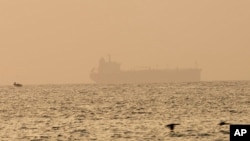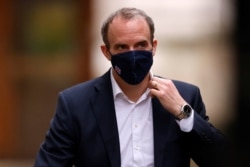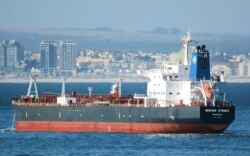Britain's top military commander, General Nick Carter, said Wednesday that Western powers need to retaliate for a suspected Iranian drone strike on an oil tanker, which killed a British security guard and the ship's Romanian captain — otherwise Tehran will feel emboldened.
Speaking to the BBC, Carter, chief of the British Defense Staff, said if a regime of deterrence is not restored in the Gulf, there will be more attacks and a higher risk of "miscalculation" by Iran. "What we need to be doing, fundamentally, is calling out Iran for its very reckless behavior," he said.
Iran has vehemently denied playing any role in the July 29 drone strike on the MV Mercer Street off the coast of Oman. The vessel is Japanese-owned but managed by London-based firm Zodiac Maritime, which in turn is owned by Israeli billionaire Eyal Ofer.
The British government and the administration of U.S. President Joe Biden have accused Iran of being behind the deadly drone strike with Britain's foreign secretary, Dominic Raab, labeling it "unlawful and callous."
Earlier this week, he added, "We believe this attack was deliberate, targeted and a clear violation of international law by Iran. Iran must end such attacks, and vessels must be allowed to navigate freely in accordance with international law."
U.S. Secretary of State Antony Blinken said Sunday there was "no justification for this attack, which follows a pattern of attacks and other belligerent behavior," adding, the U.S. is "confident" Iran carried out the attack, using multiple drones.
The Israeli government Wednesday publicly accused an Iranian military officer, Saeed Ara Jani, of overseeing the strike, alleging Ara Jani heads the Revolutionary Guards' drone unit.
"For the first time ever, I will also expose the man who is directly responsible for the launch of suicide UAVs [unmanned vehicles] — his name is Saeed Ara Jani," Israeli Defense Minister Benny Gantz said.
"The UAV command conducted the attack on the Mercer Street. Saeed Ara Jani plans and provides the training and equipment to conduct terror attacks in the region," Gantz added in a briefing to ambassadors from member states of the U.N. Security Council.
Iran's foreign ministry spokesman, Saeed Khatibzadeh, described "as totally suspicious the reports of successive security incidents involving vessels in the Persian Gulf and the Sea of Oman" and warned "against any effort to create a vicious atmosphere to pursue certain political goals."
In a tweet, he reaffirmed Iran's "strong commitment to regional stability & maritime security," and said, "Iran stands ready to offer assistance in case of any maritime accidents."
The drone strike blasted a hole in the oil tanker's bridge when the vessel was 159 kilometers from Al Duqm port in Oman, according to British and U.S. officials, who say they are coordinating a possible response to the assault. What form the retaliation will take or when is not clear.
In his interview with the BBC, Carter said, "We have got to restore deterrence because it is behavior like that which leads to escalation, and that could very easily lead to miscalculation and that would be very disastrous for all the peoples of the Gulf and the international community."
Carter's remarks came as Iranian hijackers were accused of boarding another oil tanker off the coast of the United Arab Emirates on Tuesday before leaving the vessel 24 hours later, Britain's Royal Navy reported.
Britain is due to raise the issue of the Mercer Street incident formally at a U.N. Security Council meeting scheduled for Friday.
Raab tweeted that the U.K. has written to U.N. Security Council President T.S. Tirimurti, alongside Romania and Liberia, "to raise Iran's attack on MV Mercer Street."
He added, "The Council must respond to Iran's destabilizing actions and lack of respect for international law."
Israeli Prime Minister Naftali Bennett on Sunday said during a Cabinet meeting, "We know, at any rate, how to convey the message to Iran in our own way."
The U.S. State Department initially said the attack involved "one-way explosive UAVs," otherwise known as suicide drones. Previously, shipping attacks in the Gulf have more often than not involved limpet mines, which can be placed on the hull of a target vessel. The switch in tactics is being seen by Western diplomats and Israeli defense experts as a major escalation in a shadow war between Iran and Israel.
Israeli Defense Minister Gantz on Monday accused Iran of intensifying aggression in the Gulf. He told the Knesset, or parliament, that there are "hundreds of Iranian UAVs in Iran, Yemen, Iraq and other countries." He added, "We will act to remove any such threat."







